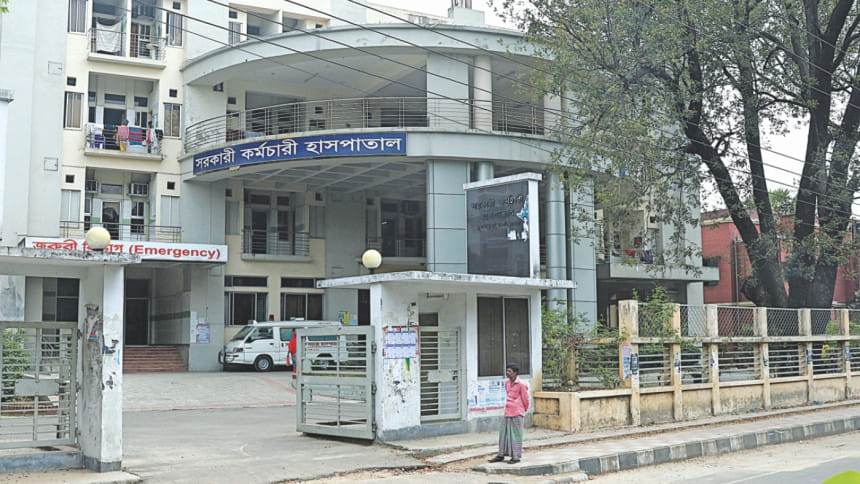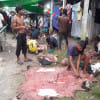A hospital for poor

The Sarkari Karmachari Hospital could be an inspiration for our policymakers in designing healthcare services for our garment and expatriate workers and their families.
At the hospital, a patient has to only pay Tk 10 to get services like admission for long-term treatment, free medicine, including antibiotics, and four healthy meals a day. The Tk 10 is for the ticket.
“This is a token charge introduced three months ago and before that the services used to be absolutely free,” said Tapan Chandra Banik, joint secretary (secretariat & welfare) of the Ministry of Public Administration.
The health ministry has placed 72 doctors and 45 nurses on deputation to work for the hospital in the city's Fulbaria area being administered by the Ministry of Public Administration.
The hospital's capacity was raised to 150 beds from 50 beds in 2014, a year after the ministry took over its administration. Before that, the health ministry took care of the hospital ever since it was turned into the Sarkari Karmachari Hospital from railway hospital in 1978.
“It all became possible as the public administration wanted to take care of the health of its workers,” Tapan said, adding, “The authorities concerned can do the same for our garment and expatriate workers.”
There are, however, about 1.5 million government employees in the country.
Hospitals of this kind are called “Special Purpose Hospital”, said Prof Shamiul Islam, director hospitals & clinics of the Directorate General of Health Services (DGHS) of the health ministry.
Ministries of home and the railways have such hospitals for treating members of police, BGB and the railways, while the army personnel have Combined Military Hospital, he added.
“On my ministry's behalf, I promise to assist with any move, concerning setting up of such hospitals for our garment and expatriate workers, to the best of our abilities,” said Shamiul Islam.
“I will share the idea with my bosses in the ministry,” he added.
Sharing her firsthand experience at the hospital, its superintendent Sadia Sajmin Siddiqua said urban work patterns and lifestyle were found to have largely determined the diseases the government employees suffer from.
She said her hospital was on the process of introducing new departments like neuro-medicine, physical medicine and urology, as long hours of desk jobs increased the cases of back pain, cardiac arrest and diabetes among government employees.
Numerous obstacles -- manpower shortage, inadequate logistics and infrastructure supports, and financial constraints -- may become excuses for not undertaking the challenging task of building similar hospitals, but there is always a way if there is a will, said Sadia.
According to her, there were 86 patients admitted to the hospital on March 13 while 500 to 800 patients visit the hospital's outdoor department a month.
The hospital's budget for 2015-2016 fiscal year was about Tk 10 crore, while it sought Tk 15 crore for 2016-2017.
“If we can manage the hospital being entirely dependent on the public exchequer, it should be many times easier for the authorities concerned to operate hospitals for garment and expatriate workers,” said Sadia.
An estimated 4.4 million workers are employed in the $25.6 billion garment industry while 9 million expatriates remit $16 billion a year.
Bangladesh Garment Manufacturers and Exporters Association President Siddiqur Rahman claimed to have 10 health centres in and around the capital and a 50-bed hospital in Chittagong in operation for garment workers.
According to him, another hospital was under construction in Dhaka.
“But, I think we can serve our workers' better if we receive government's assistance,” said Siddiqur.
State Minister for Labour and Employment Mujibul Haque could not be reached for his thoughts on the matter.
But, Expatriates' Welfare & Overseas Employment Minister Nurul Islam found the idea “considerable”.
“I will keep your suggestion in my mind,” said Nurul.
The privileges stemming from offering the workers' health services are many, according to the Sarkari Karmachari Hospital's urologist Amirul Islam.
“When a worker, either employed at home or abroad, has the certainty of receiving treatment for him and his family, he is relieved of a major concern in life,” said Amirul.
“Now he will concentrate more on work.”

 For all latest news, follow The Daily Star's Google News channel.
For all latest news, follow The Daily Star's Google News channel. 







Comments